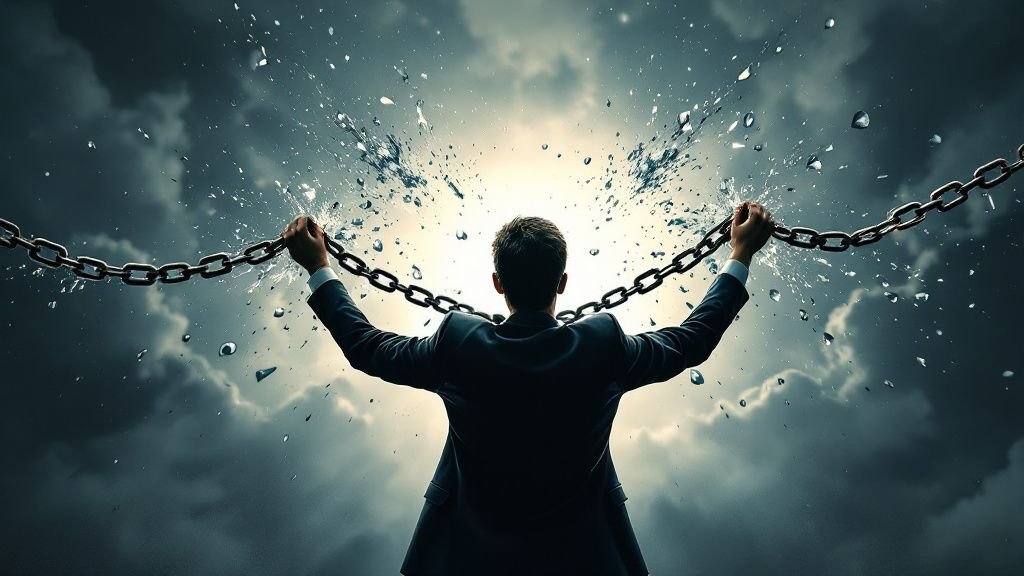To break free from the chains of a victim mindset is to embark on a transformative journey towards empowerment and self-discovery. The journey begins by recognizing the psychological patterns that ensnare many in the web of victim mentality. Examples abound in daily life, where one may blame external circumstances for their predicaments without taking proactive steps. By adopting mindset change techniques, individuals can learn how to stop playing the victim and instead cultivate resilience. Workshops for victim mentality and support groups for victim recovery offer invaluable resources for those seeking guidance. When individuals commit to Overcoming victim mentality, they often discover the liberating truth that they hold the power to shape their destinies. As they shift their perspectives, they not only end the cycle of victim mentality in relationships but also open the door to personal growth and fulfillment.

Understanding the Victim Mindset
The victim mindset is often characterized by a pervasive sense of powerlessness and blame. Individuals entangled in this mindset frequently exhibit characteristics such as deflecting responsibility and perceiving themselves as subjects of unfair circumstances. Understanding the psychology of victim mentality is crucial. This mindset doesn’t just thrive in isolation; it often seeps into relationships, creating cycles where personal growth is stunted, and progress feels elusive.
One practical tip to begin shifting this mindset is to try incorporating daily affirmations that counter negative self-talk. Victim mindset quotes, when used positively, can transform an internal narrative. This technique takes time but becomes powerful in breaking down the walls of self-imposed limitations. As individuals practice overcoming victim mentality, they open pathways to self-awareness and resilience.
The impact of victim mentality in the workplace can be profound, hindering career advancements and fostering a toxic environment. Recognizing signs of this mindset enables individuals to foster healthier professional relationships and encourage a culture of accountability. For those seeking broader community support, workshops for victim mentality offer guidance and camaraderie, paving the way for collective healing and understanding.
In personal spheres, victim mentality in relationships often manifests as chronic dissatisfaction or conflict. By engaging with online courses for mindset change, participants can gain new tools to break free and redefine their interpersonal dynamics. With commitment and the right guidance, the cycle can be disrupted, making space for healthier, more fulfilling connections.

The Impact of a Victim Mindset
The influence of a victim mindset can permeate various aspects of life, often leading to stagnation and a diminished sense of agency. Individuals entrenched in this mentality may experience victim mentality characteristics such as a persistent sense of helplessness and dependency, which can foster feelings of depression. These emotions may intensify when left unaddressed, impacting personal well-being and hindering the ability to thrive. Recognizing these signs is the first step towards transformation.
While many believe that adopting a victim mindset is a result of external circumstances beyond control, there’s a powerful argument for the role of personal agency. Emphasizing Mindset change techniques can enable individuals to take ownership of their narrative and break free from victim mentality. This shift in perspective is crucial for those seeking to understand how to stop feeling like a victim and regain control.
The victim mindset also significantly affects relationships, often creating cycles of misunderstanding and resentment. Victim mentality in relationships can manifest as an inability to accept criticism or a tendency to withdraw. By cultivating self-awareness and empathy through support groups for victim recovery, individuals can learn how to nurture healthier and more balanced connections, thus overcoming the limiting beliefs that hold them back.
In professional settings, the impact of a victim mindset is evident in the workplace where productivity and collaboration might suffer. Workshops for victim mentality can provide employees with the tools they need to foster a more constructive and cooperative environment. Embracing a proactive approach can lead to enhanced workplace dynamics and opportunities for professional growth.

Recognizing Your Victim Patterns
Recognizing the patterns of a victim mindset requires a willingness to reflect on personal behaviors and reactions. Common Victim mentality examples include feeling habitually wronged or viewing oneself as exempt from positive change. Such patterns are often rooted in past experiences and reinforced by internal narratives. By becoming aware of these behaviors, individuals can begin the process of overcoming victim mentality and embrace a proactive approach towards healing and personal growth.
The journey toward self-awareness can be transformative. In the next few years, the increased focus on mindset change techniques is likely to result in more people breaking free from the cycles of victimhood, fostering a society that values resilience and empowerment. Learning how to stop playing the victim by adopting new cognitive strategies can dramatically improve one’s outlook and opportunities in life.
In relationships, these patterns often manifest as repeated conflicts or unmet expectations, where partners may feel trapped in unproductive cycles. Recognizing victim mentality characteristics within oneself can lead to more open communication and healthier partnerships. Engaging with online courses for mindset change provides additional tools to foster positive change in personal interactions, laying the foundation for lasting satisfaction and understanding.
In organizational environments, recognizing a victim mentality in the workplace can pave the way for personal and collective improvement. By identifying and challenging these patterns, both employees and leaders can work towards a culture that promotes accountability and growth. Participation in workshops for victim mentality can equip individuals with the necessary skills to foster a more collaborative and empowering professional atmosphere.

Shifting Your Perspective
Shifting one’s perspective involves a conscious decision to adopt a new way of thinking, leaving behind limitations imposed by a victim mindset. This metamorphosis is not effortless but pays dividends in personal empowerment and the ability to overcome challenges. The Psychology of victim mentality often traps individuals in a loop of negativity, but embracing mindset change techniques can lead to dramatic transformation and newfound optimism.
This shift in mindset is transformative, creating ripples of change that extend into all areas of life. In the next few years, as more individuals tap into mindset change workshops and online courses for mindset modification, the collective capacity to transform limiting beliefs into empowering actions is likely to increase significantly. Such widespread personal growth can lead to stronger communities built on resilience and mutual support.
In relationships, adopting a broader perspective can dismantle long-standing barriers. Individuals can transcend victim mentality in relationships by fostering open communication and empathy. Recognizing the benefits of this shift encourages deeper connections and a shared journey of growth. Access to resources such as support groups for victim recovery can facilitate ongoing development and understanding.
In professional life, a shift in perspective can unlock potential previously obscured by victim mentality characteristics. When individuals challenge these ingrained patterns, they can cultivate a work environment that thrives on accountability and collaboration. Participating in professional development through workshops for victim mentality empowers employees to excel, contributing to more harmonious workplaces.

Building Resilience and Strength
Building resilience and strength involves embracing adversity as a catalyst for growth and development. As individuals begin to understand How to stop playing the victim, they often discover untapped reserves of inner strength. Engaging in mindset change techniques empowers them to turn obstacles into opportunities, encouraging a proactive approach to life’s challenges. This personal transformation often results in an enduring sense of resilience and a positive shift in perspective.
The current state of resilience-building initiatives reveals a trend towards integrative approaches, combining emotional intelligence and psychological techniques. Workshops for victim mentality and support groups for victim recovery are becoming increasingly popular as they offer safe spaces for healing and empowerment. These programs are designed to address both victim mentality characteristics and the emotional complexities of overcoming victim mentality, equipping individuals with the tools necessary for sustainable change.
As resilience is harnessed, individuals often notice an improvement in their personal and professional relationships. Victim mentality in relationships diminishes as people develop healthier communication skills and stronger emotional resilience. Online courses for mindset change have been instrumental in fostering these developments, highlighting the importance of ongoing education and self-awareness in building mental fortitude. This evolving landscape underscores the profound impact of resilience on the human experience.

Maintaining a Positive Mindset
Maintaining a positive mindset involves cultivating habits that reinforce optimism and resilience. Individuals who have learned how to get out of a victim mindset often engage in practices that nurture positivity, such as gratitude journaling and meditation. These activities help to counteract negative thoughts and build a strong foundation for mental well-being. By prioritizing positivity, they are better equipped to face challenges and maintain emotional stability.
Looking ahead, the development of positive mindset strategies is expected to evolve in diverse ways, integrating advancements in technology and psychological research. Online courses for mindset change are likely to expand, offering personalized tools that cater to individual needs and preferences. This shift may provide broader access to effective techniques that empower more people to sustain positivity in various aspects of their lives.
For those emerging from victim mentality in the workplace, maintaining a positive mindset can significantly enhance personal and professional satisfaction. As they adopt mindset change techniques, they contribute to a more harmonious and productive work environment. By embracing the power of positivity, individuals can continue to thrive and inspire others along the way, gradually reshaping the dynamics within their teams and organizations.
In personal relationships, maintaining a positive outlook can transform interactions into supportive, nurturing experiences. Victim mentality in relationships diminishes as individuals stop feeling like a victim and start appreciating the strengths in their bonds. Support groups for victim recovery often focus on reinforcing this positivity, enabling participants to foster healthier connections built on mutual respect and understanding. These groups play a crucial role in sustaining a culture of compassion and growth.

Frequently Asked Questions
What are some effective mindset change techniques to overcome a victim mindset?
Effective mindset change techniques include practicing gratitude daily, reframing negative thoughts into positive ones, and engaging in mindfulness meditation. These practices help individuals gain awareness of their thought patterns and develop a more resilient mindset. By consistently applying these techniques, individuals can learn to take control of their emotional responses and foster personal growth.
How does victim mentality affect relationships?
Victim mentality in relationships can lead to misunderstandings, resentment, and communication breakdowns, as individuals may find it challenging to accept responsibility for their actions. This mindset creates a cycle where both partners feel unheard and unappreciated, hindering emotional connection. Recognizing and addressing these patterns helps cultivate healthier, more supportive relationship dynamics.
Can professional environments be impacted by a victim mindset?
Yes, victim mentality in the workplace can negatively impact productivity and morale, creating a toxic environment where blame is more common than accountability. It often leads to poor teamwork and stifles innovation, as individuals are less inclined to take initiative. Addressing this mentality through workshops and mindset change initiatives can improve collaboration and enhance overall workplace culture.
What role do support groups play in overcoming a victim mindset?
Support groups for victim recovery offer a safe space for individuals to share experiences, gain insights, and receive encouragement from peers who understand their struggles. These groups help participants develop coping strategies and gain confidence in their ability to change. By fostering a sense of community, they provide vital emotional support and motivation for sustainable mindset change.
How can online courses help in maintaining a positive mindset?
Online courses for mindset change offer structured guidance and practical tools for individuals looking to maintain a positive outlook. These courses often include activities and exercises designed to shift negative thinking and reinforce positive habits. Participants benefit from accessible resources that encourage continued growth and empowerment in everyday life.


